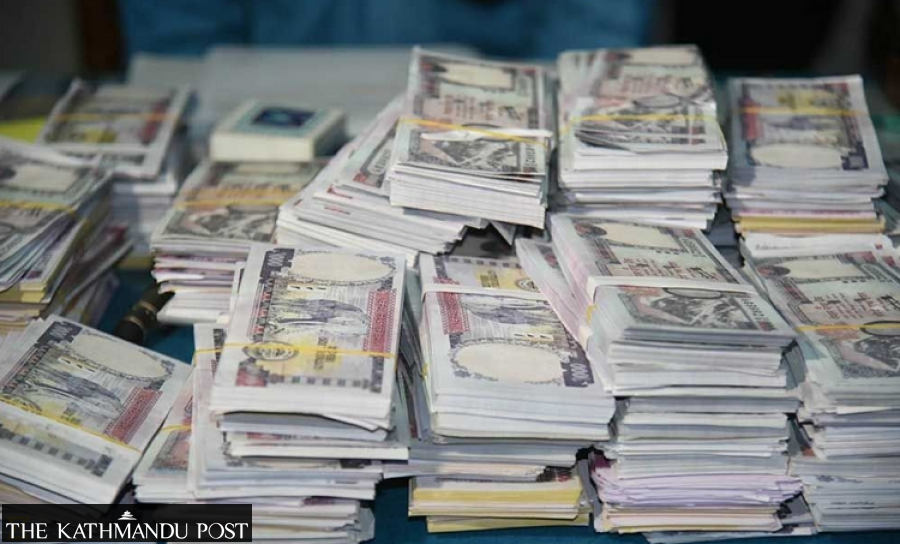Money
Liquidity crunch likely to continue for a few months
The government will raise over Rs80 billion in income tax in mid-January, draining liquidity from the banking system.
Prithvi Man Shrestha
With the shortage of loanable funds forcing most banks and financial institutions to halt lending, the crunch is likely to continue as the government is planning on drawing more money from the banking sector in income taxes by mid-January next year, officials and experts said.
As per Section 93 of Income Tax Act-2002, taxpayers should pay 40 percent of estimated tax by mid-January as first instalment. According to Shovakanta Poudel, director general at the Inland Revenue Department, the department expects to collect over Rs80 billion in income taxes by mid-January in addition to other taxes including value added tax and excise duty, which are paid on a monthly basis.
Banks and financial institutions themselves are required to pay the first instalment of income tax by mid-July while other enterprises also draw money from the banking sector to pay taxes to the government, draining liquidity from the banking system.
“Considering the potential aggravation of the liquidity crunch, the central bank this week decided to pump into the banking sector a refinance of Rs92 billion,” said Prakash Shrestha, chief of economic research department at the central bank. “The government also decided to allow banks to count up to 50 percent of the reserve funds of local governments as deposits, up from the previous threshold of 50 percent.”
The local government funds are expected to add around Rs50 billion in liquidity to the banking system. But the situation is critical with the average credit to deposit ratio of banks and financial institutions already at 92 percent, while the threshold set by the central bank is 90 percent, according to the Nepal Rastra Bank.
“The situation of liquidity crunch may not deteriorate because of the measures we have taken, but the situation is likely to remain tight for at least 3 to 4 months” said Shrestha. “We can expect the situation to improve in March when government spending will pick up and import control measures are likely to slow down lending.”
Shrestha does not rule out the possibility of a prolonged period of liquidity crunch in the banking sector. In the fiscal year 2018-19, the banking sector had seen a shortage of loanable funds for an entire year.
The current liquidity crunch is the result of excessive lending in the first five months of the current fiscal year coupled with the government failure to spend its budgetary resources.
According to central bank statistics, banks and financial institutions collected Rs116 billion in deposits until December 21 since the start of the fiscal year 2021-22 in mid-July. During the same period, credit expanded to Rs438 billion.
Besides liquidity crunch and surging imports, falling remittances, depleting foreign exchange reserves, rising inflations, damage to paddy crops by untimely rainfalls in October and shortage of fertilisers for winter crops, among other factors, indicate that the economy is in crisis.
Central bank officials at an interaction on Wednesday said that most of the lending in the last five months went into import financing.
Continued liquidity crunch means even the productive sector may be denied credits which would ultimately affect economic growth even though Finance Minister Janardan Sharma has been claiming, albeit without evidence, that the economy was performing well.
Bidyadhar Mallik, a former federal affairs minister and finance secretary, also thinks the liquidity crunch will continue for the time being, particularly due to an impending tax payment deadline.
“But measures taken by the government and central bank will ultimately ease the situation,” he said. “If the government spending picks up and Finance Minister Sharma, like he has said, transfers the budget from underperforming projects to performing projects, the situation is likely to ease by February-March.”
There is more than Rs250 billion in cash reserves due to the failures of the three layers of government to spend the allocated funds, according to the Financial Comptroller General Office, the government agency responsible for keeping accounts of government incomes and expenditures.
The federal government’s spending is just 25 percent with capital spending accounting for 7 percent, according to the office.
Further tax collections will lead to piling up of resources in the accounts of the federal, provincial and local governments.
Mallik said the government could delay tax collection without imposing fines on taxpayers if it is unable to speed up spending.




 9.89°C Kathmandu
9.89°C Kathmandu















